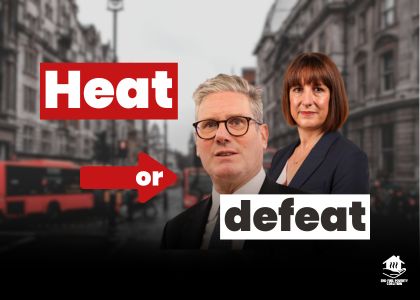Reports in the media suggest that the Chancellor is set to raid the funding for its flagship Warm Homes Plan to pay for energy bill reductions.
The breakdown of the £13.2bn Warm Homes Plan funding was due to be announced last month and was expected to include additional support for social housing, heat pumps, home upgrade loans and local authority-led retrofit schemes.
At the Comprehensive Spending Review, the End Fuel Poverty Coalition stressed that this £13.2bn must be addition to the c.£8.5bn (over 5 years) budget for existing schemes like the Energy Company Obligation (ECO). The Coalition wrote to Ministers [pdf] setting out reforms needed to this scheme following a critical National Audit Office report and has in the past called for this to be funded via general taxation.
However, the proposals briefed to the Guardian would effectively substitute parts of the Warm Homes Plan for existing schemes. This would essentially reduce the total £21.7bn energy efficiency pot by 40% over 5 years, harming the very efforts that would help to bring down bills in the long term and help end the suffering of people living in cold damp homes.
A spokesperson for the End Fuel Poverty Coalition, commented
“Any cuts to the Warm Homes Plan or other programmes to improve housing conditions would be a short-sighted act of betrayal by the Chancellor.
“These electorally popular policies can help bring down energy usage in a safe way and improve the energy efficiency of the homes of people in fuel poverty.
“We obviously understand the urgent need to cut energy bills, but the Chancellor – who previously brought us the Winter Fuel Payment fiasco – appears to be listening to the wrong people.
“It is entirely possible for the Government to help reduce energy bills, but Ministers need to look in the right place for changes.
“Given that between a quarter and a third of the average energy bill is profit for different parts of the energy industry, the Chancellor should look at how the Windfall Tax could be improved, rather than giving tax breaks to energy firms as she is being lobbied to do.
“Other ways to bring down bills include addressing electricity pricing and inefficiencies in the market, using public investment to help fund grid upgrades and real reform of standing charges. We would be happy to talk to the Chancellor about our recommendations.”
The industry trade body, Energy UK, has also set out economic reasons why this move could harm efforts to improve cold damp homes.

